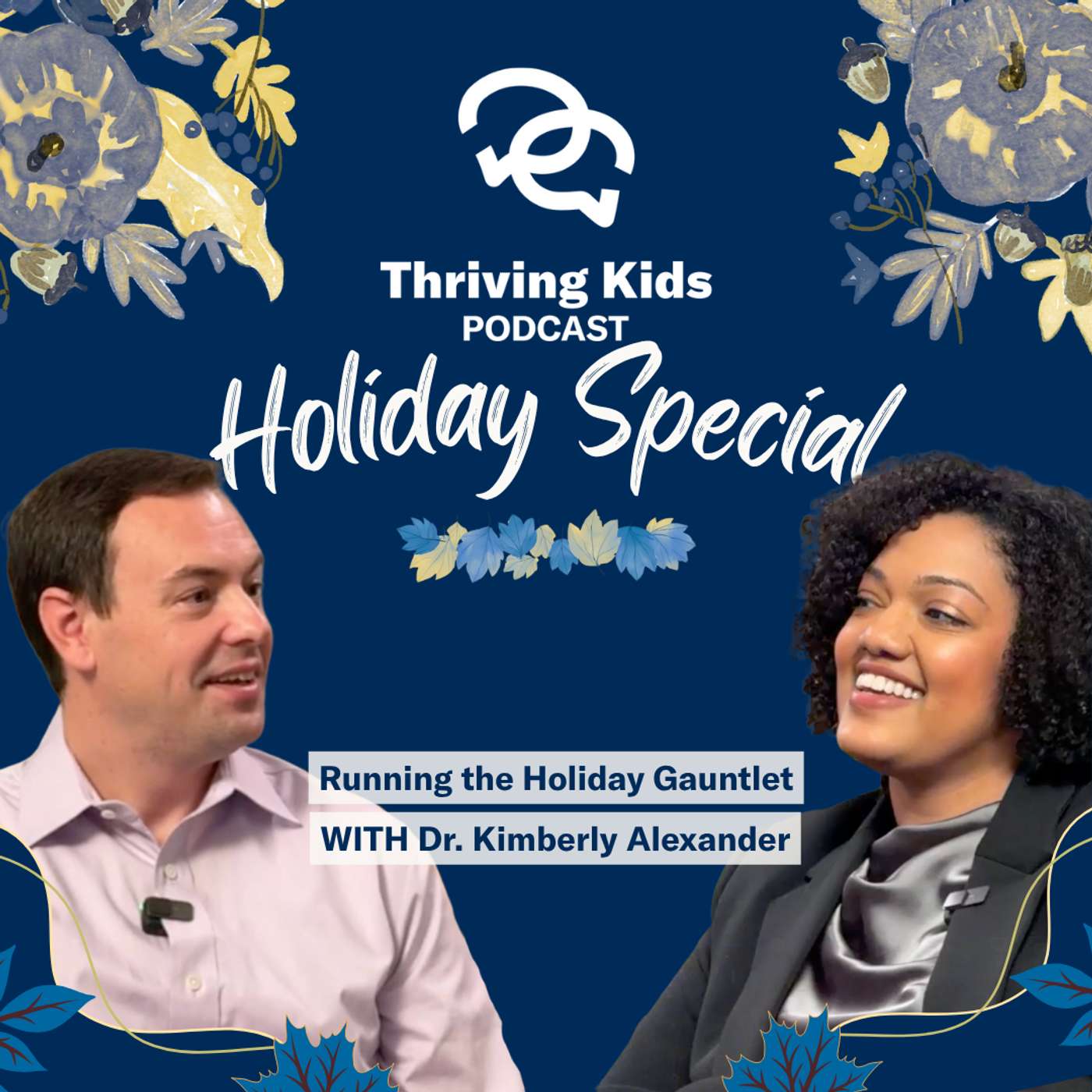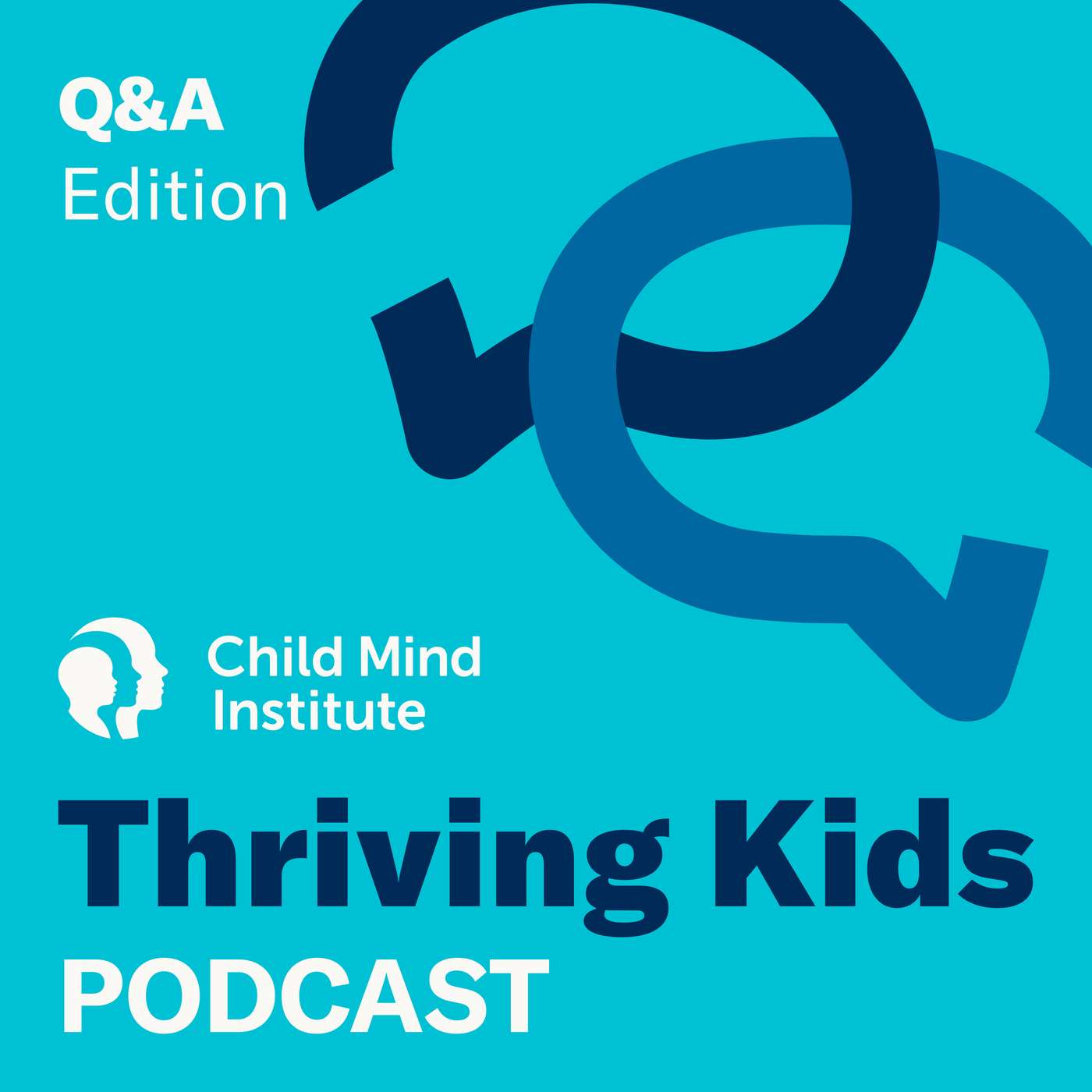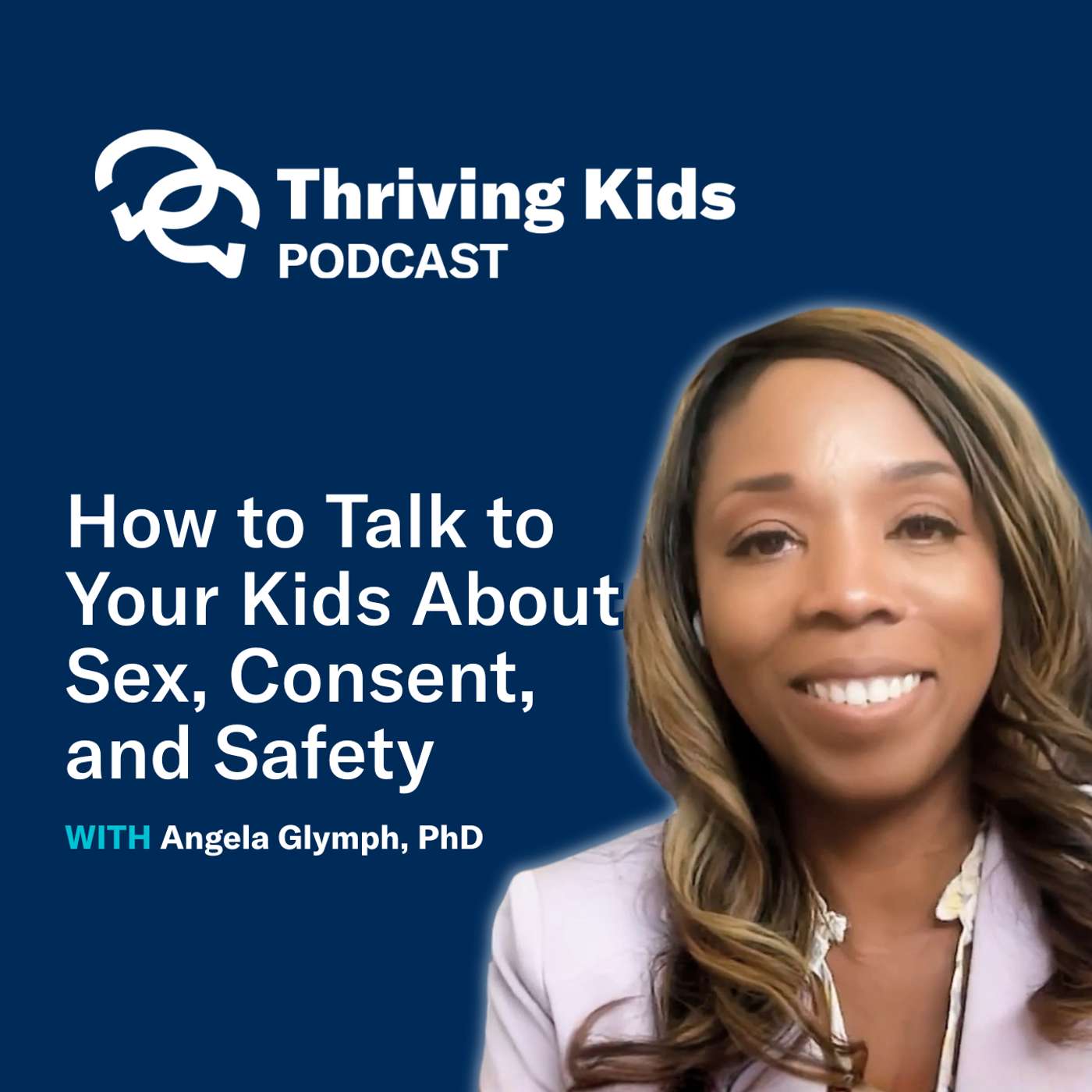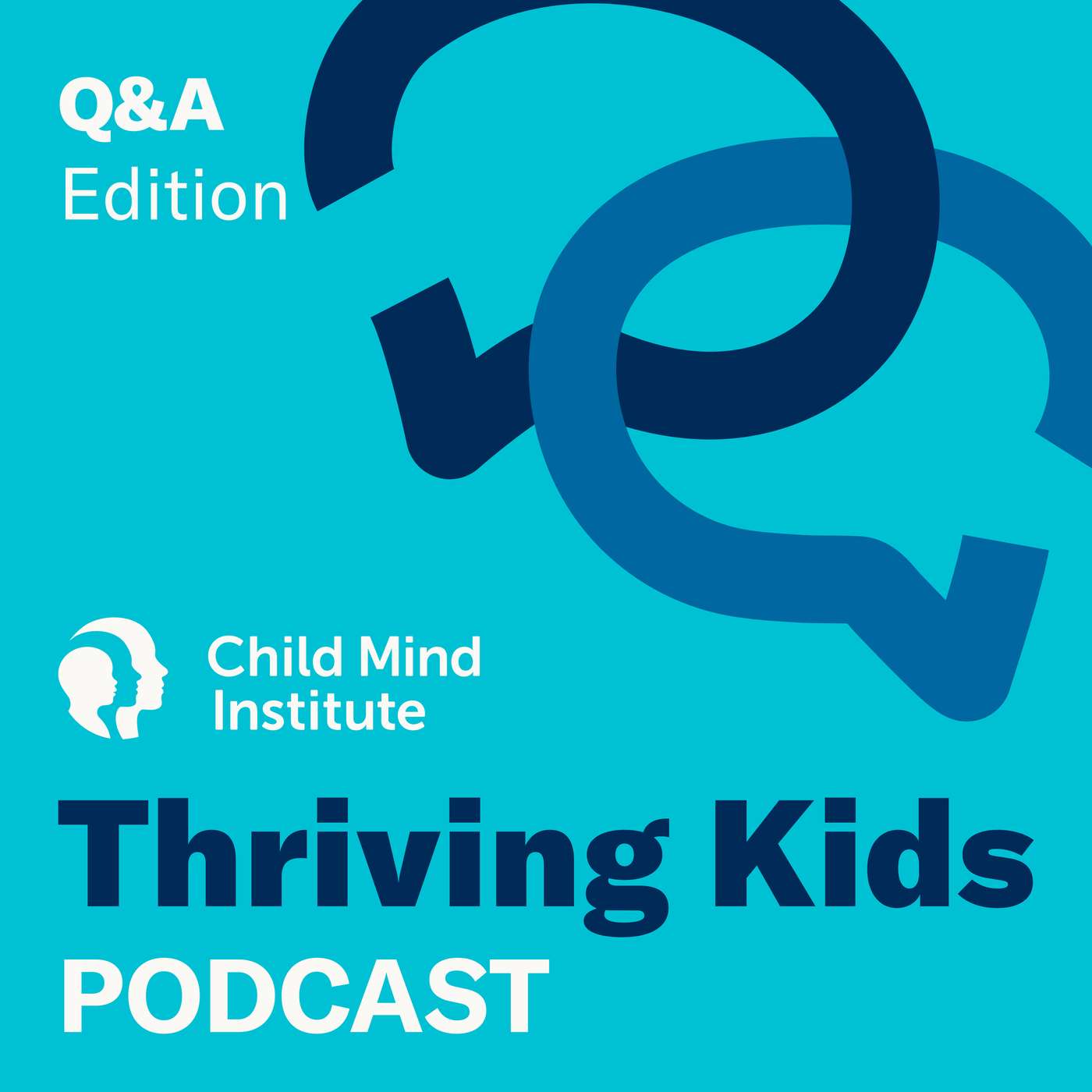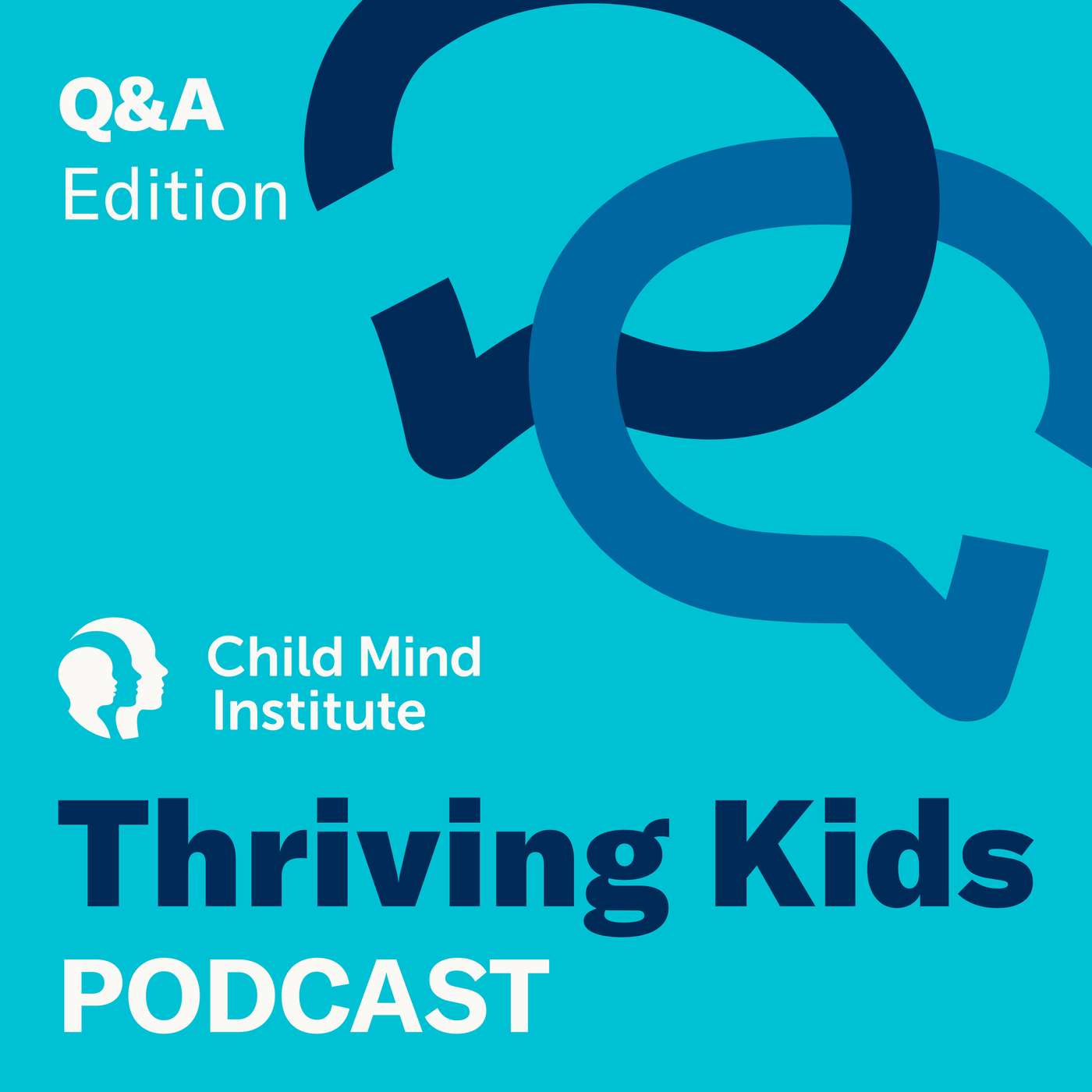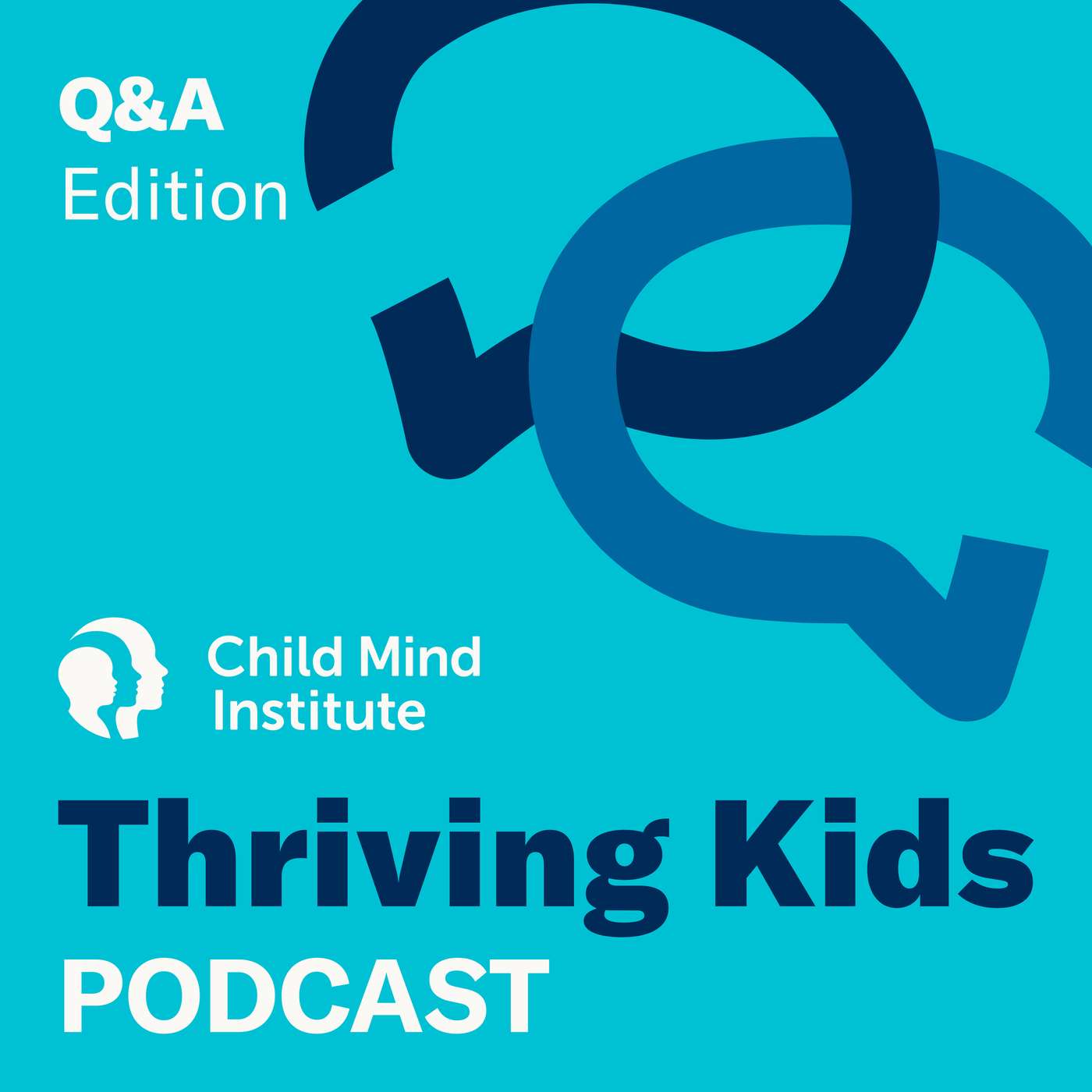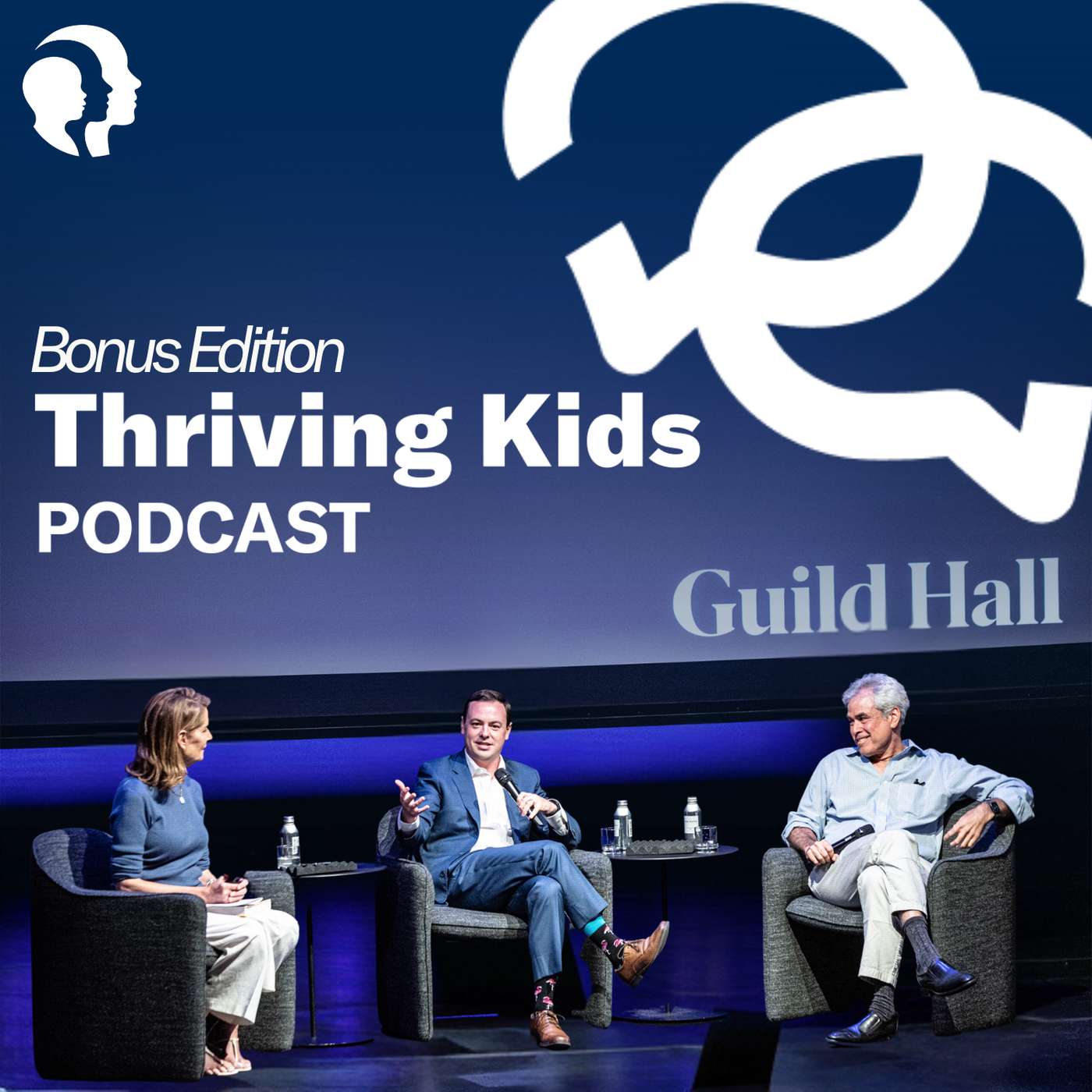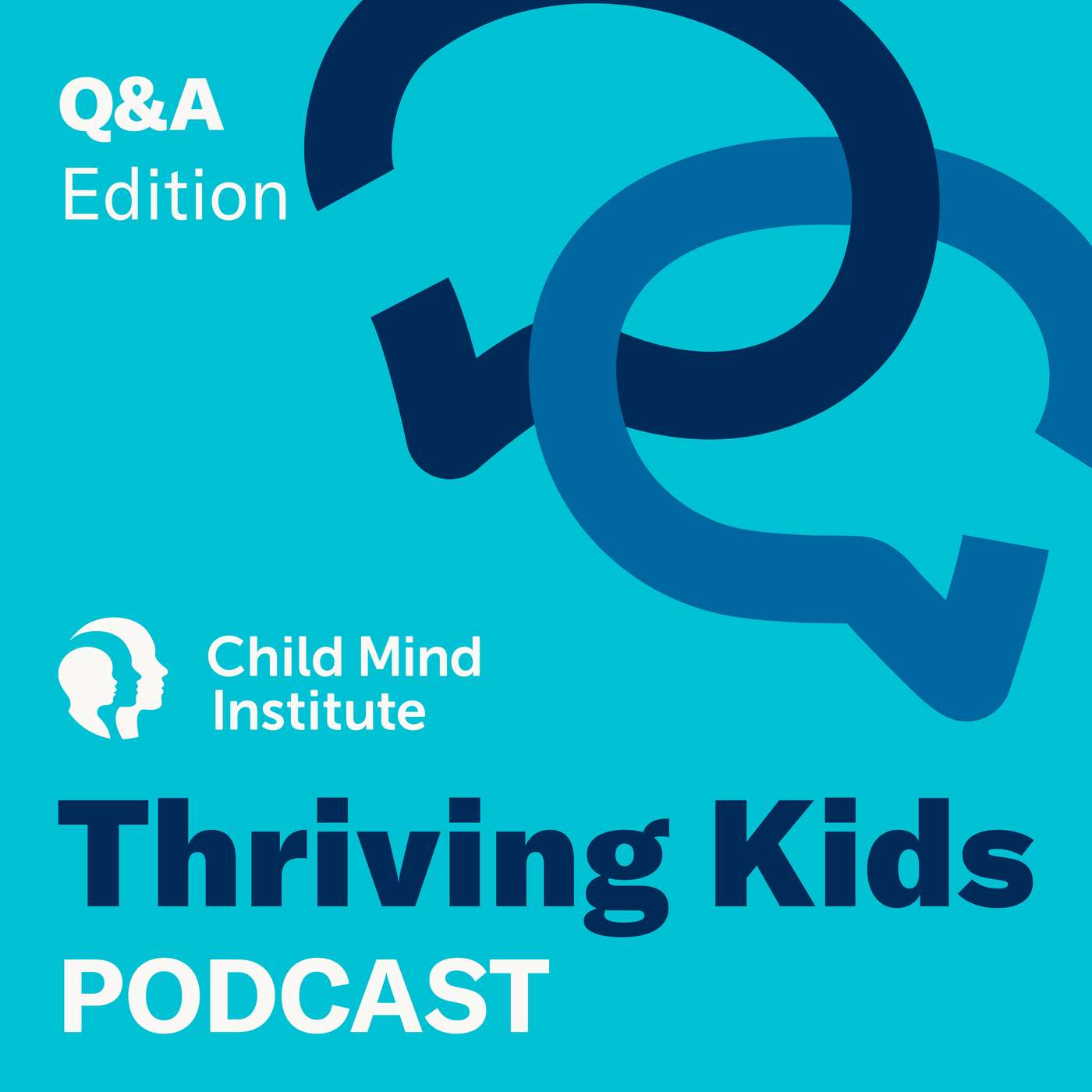Discover Thriving Kids: A Parenting Podcast From the Child Mind Institute
Thriving Kids: A Parenting Podcast From the Child Mind Institute

Thriving Kids: A Parenting Podcast From the Child Mind Institute
Author: The Child Mind Institute
Subscribed: 21Played: 141Subscribe
Share
© Child Mind Institute
Description
Thriving Kids is a podcast for parents and caregivers who want clear, honest answers about child and adolescent mental health. Hosted by Dr. Dave Anderson, clinical psychologist at the Child Mind Institute, each episode tackles a common parenting challenge — from anxiety to tantrums to school struggles — with practical strategies backed by science.
You’ll hear real talk, expert advice, and compassionate guidance from clinicians who work with kids every day.
New episodes every week, with companion newsletters for easy reference.
You’ll hear real talk, expert advice, and compassionate guidance from clinicians who work with kids every day.
New episodes every week, with companion newsletters for easy reference.
21 Episodes
Reverse
The holidays can feel like a marathon for parents — full of expectations, logistics, and emotions. In this episode, Dr. Dave Anderson talks with clinical psychologist (and new parent) Dr. Kimberly Alexander about what she calls “running the gauntlet” of the holiday season.They unpack how to manage your own expectations, keep kids regulated, and handle tricky family moments — without losing your sense of humor or sanity.You’ll learn:Why “know thy child” might be the best holiday mantraHow to balance structure and flexibility when school’s outWhat to do when your child’s behavior doesn’t match your “perfect family” visionHow to set boundaries with relatives who take it personallyTips for teaching gratitude and handling gift-giving meltdownsDr. Alexander also shares what she calls “the Kim package” — her practical approach to balancing family needs, setting limits with grace, and remembering that every year looks different.Chapters (adjust as needed):00:00 – Welcome to Thriving Kids01:00 – Why the holidays can feel so intense for parents05:00 – The “perfect family” myth and social media pressure07:00 – “Know thy child”: tailoring expectations10:00 – Setting structure and boundaries that work13:00 – Handling relatives who push back17:00 – Teen dynamics and validation20:00 – Teaching gratitude (and managing disappointment)29:00 – Giving yourself graceRelated resources:childmind.org/article/helping-kids-cope-with-holiday-stress/childmind.org/article/managing-family-stress-during-the-holidays/childmind.org/article/helping-kids-cope-with-changes-in-routine/
Parents sent in smart, honest questions about how to keep conversations about sex, consent, and safety going at home. In this Q&A episode of Thriving Kids, Dr. Dave Anderson from the Child Mind Institute answers questions about when to start, what’s age-appropriate, and how to talk about everything from consent to porn — without losing your kid’s trust.You’ll learn how to:• Start early with body boundaries and accurate language• Talk about consent in everyday life• Handle porn exposure and online curiosity• Balance privacy, safety, and your family’s values• Keep the door open even when teens roll their eyesKey topics• What age to start talking about sex and consent• How to explain the biology of reproduction without euphemisms• Setting boundaries and modeling consent in daily life• Talking about porn and online exposure without shame• Balancing privacy and safety with teens in relationships• How to share family values without sounding preachy• What to do if your teen is already sexually active• Keeping awkward conversations open and honestResources mentionedBooks• What Makes a Baby, Sex Is a Funny Word, You Know, Sex – Cory Silverberg• Being You and Yes! No! – Megan MadisonOrganizations & platforms• Peer Health Exchange• Selfsea – digital platform by Peer Health Exchange with stories and tools created with and for young people• Planned Parenthood – resources and education for sexual and reproductive healthFurther reading• How to Talk to Kids About Sex and Boundaries – Child Mind Institute• How to Talk to Your Kids About Porn – TIME, by Dr. Dave Anderson• Talk to Your Kids About Sex and Healthy Relationships – health.gov• The Best Sex Education Books for Kids of All Ages (And Their Parents!) – Parents / AAP
Talking to kids about sex, consent, and safety can feel intimidating — or like something you’d rather put off. But kids are already getting information from somewhere, and it’s not always accurate or safe. In this episode of Thriving Kids, clinical psychologist and host Dr. Dave Anderson talks with Dr. Angela Glymph, CEO of Peer Health Exchange, about how to have honest, age-appropriate conversations that protect kids, affirm who they are, and strengthen your relationship with them.They break down what “comprehensive sex education” really means, how to start early with body autonomy and consent, and how to keep the conversation going through elementary school, middle school, and the teen years — without needing to be a “perfect” expert.GuestDr. Angela Glymph is the CEO of Peer Health Exchange, a national youth nonprofit dedicated to helping young people stay safe, healthy, and affirmed — no matter who they are or where they live. Her work centers adolescent health equity, social-emotional learning, and youth-led, inclusive health education. She’s also a parent, navigating these conversations at home herself.In this episode, we discuss:What comprehensive sex education actually includes (it’s more than just “the talk”)Why medically accurate, truthful information keeps kids saferHow kids really learn about sex, consent, and relationships (school, peers, online, social media)The benefits of giving kids good information vs. leaving them to “figure it out”How to teach body autonomy and consent starting in early childhoodWhy using correct terms (like vulva, penis, sperm, egg) mattersHow to build on the conversation in elementary school, middle school, and beyondWhen and how to talk about contraception, STIs, and safetyWhy abstinence can be part of the conversation — but not the whole thingHow to respond if your teen is already sexually activeWhat to do if you feel too awkward or underqualified to have these talksThe myth that teens don’t want to talk to parents about sex (and why it’s wrong)Age-by-age: Laying the groundworkAges 3–5 (early childhood)Simple yes/no and body boundariesNaming body parts accurately (including genitals)Basic explanation of where babies come from using truthful, simple language (e.g., sperm and egg)Ages 6–8 (early elementary)Building on earlier explanations with more biologyTalking about different family structures and ways babies come into familiesNormalizing questions and curiosityAges 9–11 (upper elementary)Puberty: what’s happening in their changing bodiesFactual explanation of sexual intercourse and pregnancy in developmentally appropriate termsIntroducing contraception and safety basicsReinforcing body autonomy and boundariesAges 12+ (middle & high school)Relationships, identity, and decision-makingMore detailed conversations about contraception, STIs, and safer sexConsent in the context of romantic and sexual experiencesHow to think about risks, pressure, and personal valuesKey takeaways for parentsIf kids don’t get information from you or other trusted adults, they will seek it elsewhere — online, from peers, or pornography.Comprehensive sex education is lifesaving: it helps prevent unintended pregnancy, STIs, and sexual violence, and it builds communication skills kids use far beyond this topic.Using medically accurate terms normalizes the conversation and gives kids language to advocate for themselves and report if something is wrong.Abstinence is a valid choice and part of comprehensive education — but it shouldn’t be the entire message.You don’t have to do this alone: your pediatrician, your child’s school, faith community, and trusted adults (like an aunt/uncle or family friend) can all help.Teens may act like they don’t want to talk to you, but many do want open, nonjudgmental conversations — they’re also trying to figure out how to approach you.Resources mentioned in the episodeBooks for kids & familiesCory Silverberg – books about bodies, reproduction, and growing up (including What Makes a Baby and later titles for older kids and teens)Megan Madison – Being You and Yes! No! (early childhood books covering gender, consent, and body autonomy)Organizations & platformsPeer Health Exchange – comprehensive, inclusive, peer-led health educationSelfsea (selfsea.org) – Peer Health Exchange’s digital platform created with and for young people, including stories and resources on sex, consent, and talking to parentsPlanned Parenthood – education and resources for teens and parents on sexual and reproductive healthFurther readingTalk to Your Kids About Sex and Healthy Relationships – health.govhttps://odphp.health.gov/myhealthfinder/healthy-living/sexual-health/talk-your-kids-about-sex-and-healthy-relationshipsThe Best Sex Education Books for Kids of All Ages (And Their Parents!) – Healthy Children / AAPhttps://www.parents.com/kids/health/best-sex-education-books-for-kids-by-age/How to Talk to Kids About Sex and Boundaries – Child Mind Institutehttps://childmind.org/article/how-talk-kids-sex-consent-boundaries/How to Talk to Your Kids About Porn – TIMEhttps://time.com/4277188/how-to-talk-to-your-kids-about-porn/About Thriving KidsThriving Kids is a podcast from the Child Mind Institute that helps you raise emotionally healthy children with practical, expert-backed advice.
In this Q&A edition of the Thriving Kids Podcast, Dr. Dave Anderson takes on parents’ top questions about raising teenagers. Building on last week’s conversation with Dr. Lisa Damour, he shares research-backed guidance for navigating everything from therapy resistance and social media boundaries to privacy battles, motivation slumps, and shifting moods — all while keeping connection and communication strong at home.Have a question for Dr. Dave? Email podcast@childmind.orgWhat you’ll learn• How to approach therapy when your teen refuses to go• The best way to address vaping or substance use without pushing your teen away• What to do when school motivation swings from “I love it” to “I don’t care”• How to set limits around social media that actually stick• Ways to balance trust, privacy, and safety at home• How to support anxious teens without reinforcing avoidance• Signs that moodiness is typical vs. when it’s time to seek help• Why staying connected — even through protest — protects teen mental healthFind related resources at childmind.org.
Adolescence can feel intense, confusing, and sometimes overwhelming for families. In this episode, Dr. Dave Anderson talks with Dr. Lisa Damour, psychologist and best-selling author, to share compassionate, practical guidance on what most powerfully supports teen mental health. Drawing on decades of experience, Dr. Damour explains why strong, caring relationships with adults are the single biggest factor in teen well-being, and why social media is only one small part of a much bigger picture.Key topics include:• The number one protector of teen mental health: consistent, caring relationships with adults• How to put social media in perspective and keep connection at the center• What healthy coping looks like for teens and four red flags to watch for (substances, avoidance, taking distress out on others, taking distress out on themselves)• How to connect with teens through respect, transparency, and curiosity• What to do when your teen’s behavior pushes your buttons• The major developmental tasks of adolescence and how parents can support them• Practical ways to respond when emotions or situations get heated• How to keep showing up and maintain the bond that matters mostResources mentioned in this episode:Child Mind Institute resources on adolescent mental healthMore from Dr. Lisa Damour, including her books, podcast, and newsletterRosalie, Dr. Damour’s AI librarian for guidance on raising teens
In this Q&A edition of the Thriving Kids Podcast, Dr. Dave Anderson takes on parents’ top questions about kids and sleep. From breaking the habit of co-sleeping to tackling bedtime fears, setting routines that stick, and knowing when to drop naps, he offers practical strategies to make nights calmer for the whole family.Have a question for Dr. Dave? Email podcast@childmind.orgWhat you’ll learn:• Step-by-step ways to help kids learn to fall asleep independently• How to create a bedroom environment that promotes restful sleep• When a soothing bedtime routine turns into stalling—and how to handle it• Signs that nighttime fears are typical vs. when they signal anxiety• Why removing screens at night matters (and how to offer alternatives)• Clues your child may be ready to shorten or give up daytime naps• Tips for managing siblings with different sleep needs and schedules• How to respond when kids keep getting out of bed after lights out• The truth about weekend late nights and sleep-ins
Building healthy sleep habits is one of the most important and sometimes most challenging parts of parenting. In this episode, Dr. Dave Anderson sits down with Dr. Shelby Harris, a clinical psychologist and board-certified sleep specialist, to share compassionate, practical guidance for families looking to improve their child’s sleep. Drawing on years of experience helping kids and parents, Dr. Harris explains why sleep matters for mental health, learning, and behavior, and how small changes can make a big difference.Key topics include:• Why sleep is essential for children’s growth, mood, and focus• How to create a sleep-friendly environment (and why “quiet, dark, cool, and comfortable” works)• The most common sleep challenges at every age and what really helps• How screens, routines, and even grandparents can impact your child’s sleep• What to do when your child wakes up too early, can’t fall asleep, or keeps leaving their room• When to worry about issues like snoring, night terrors, or persistent sleepwalking• Tips for modeling healthy sleep habits as a family• How to know when it’s time to seek help from a specialistResources mentioned in this episode:The Child Mind Institute’s Sleep ResourcesMore from Dr. Shelby HarrisPositive Parenting: Building Healthy Routines
How do you support your child through grief when you’re grieving too?In this Q&A edition of the Thriving Kids Podcast, Dr. Dave Anderson answers your top questions about helping kids navigate death, loss, and big emotions. He covers how to support neurodivergent kids when grief shows up as anger or outbursts, whether it’s okay to talk about death directly, how to explain loss to young children, what to do when waves of sadness hit out of nowhere, how much to show your own emotions, when grief becomes something more serious, and even the surprising role imaginary friends can play in healing.Have a question for Dr. Dave? Email podcast@childmind.orgWhat you’ll learn• “All feelings are welcome, all behaviors are not” — validating emotion while holding boundaries• How grief can look different in kids with ADHD or ODD — and how to respond• The clearest language to use when telling a child someone has died• What not to say when trying to soften the news• How to talk to a 5-year-old about loss in three simple steps• Why grief comes in unpredictable waves — and how to help kids ride them• How to model healthy coping when your child sees you cry• Signs that suggest it may be time to seek additional support• How pretend play and imaginary friends can actually aid the healing process
How do I talk to my child about death and grief—without making things worse or shutting down their feelings? In this episode, Dr. Dave Anderson sits down with Katie Peinovich, LCSW, to share compassionate, practical guidance for supporting kids through loss. Drawing on years of experience working with children in New York City schools who’ve faced trauma, Katie explains why it’s important to be direct, validate emotions, and model coping—even when you’re grieving too.Key topics include:• Why kids need clear, honest language (and why euphemisms don’t help)• What grief looks like in children—and why it often comes in waves• How to sit with a child’s feelings without trying to “fix” them• When to worry that grief may be interfering with daily life• Scripts for answering tough questions like “What is death?”• Whether children should attend funerals or memorial services—and how to prepare them• Creative ways kids can remember loved ones, from memory boxes to rituals• Why it’s okay for kids to see parents grieve, as long as they feel safe and lovedResources mentioned in this episode:The Importance of Self-Care for ParentsTalking to Kids About Death and GriefPositive Parenting: Talking About Difficult Topics
How do you help your child do well in school—without constant stress or conflict? In this Q&A edition of the Thriving Kids Podcast, Dr. Dave Anderson answers your top questions about supporting kids’ academic success. He covers how to support teens when peers aren’t motivated, what to do when school doesn’t fit your child’s learning style, setting boundaries that stick for disruptive behavior, handling drop-off anxiety, balancing activities without burnout, keeping kids focused when they’re not interested, building organizational skills, what to do when kids say they “hate school,” and how to talk about grades without piling on pressure.Have a question for Dr. Dave? Email podcast@childmind.orgWhat you’ll learn• Using motivational interviewing to help teens set their own academic goals• How to collaborate with teachers on realistic supports for neurodivergent learners• Daily report card systems that improve classroom behavior• Drop-off rituals and coping strategies for separation anxiety• A developmental checklist for balancing school, activities, and downtime• Practical focus hacks: participation checklists and active note-taking• Visual cues and positive reinforcement to build independence in organization• When to narrow school complaints and focus on “islands” of support• Shifting the conversation from grades to effort and process
How can I help my child do better in school—without pushing too hard or taking over? In this episode, Dr. Dave Anderson sits down with Dr. Adam Zamora, a clinical neuropsychologist at the Child Mind Institute, to talk about how to build the habits, mindset, and support systems that help kids thrive academically. From kindergarten through college, they cover everything from procrastination and motivation to homework battles, parent-teacher communication, and how to know when it’s time to get extra support.Key topics include:Building a growth mindset vs. a fixed mindsetEffective homework routines (without micromanaging)When to push, when to scaffold, and when to step backHow to work with schools and teachers as part of your child’s “village”The value of neuropsych evaluations and what they actually tell usPrepping kids for college success—academically and emotionallyResources mentioned in this episode:College Readiness ToolkitLearning, ADHD, and school success articlesGrowth mindset and praise strategies for parents
Teens can be a rollercoaster - mood swings, pushback, and “leave me alone”… until they need a ride. In this Q&A, Dr. Dave Anderson answers parents’ real questions about staying connected when teens shut you out, handling blow-ups, setting boundaries that actually stick, supporting motivation for school, navigating dating and consent, spotting the line between “typical teen” and depression, coping with rejection, and social media comparison.Have a question for a future episode? Email podcast@childmind.org.
In this special episode of Thriving Kids, Dr. Dave Anderson sits down with NYU social psychologist Jonathan Haidt for a live conversation on how smartphones and social media are transforming childhood — and what parents, schools, and policymakers can do in response.Recorded at Guild Hall in East Hampton, this discussion dives into the big questions raised in Haidt’s new book The Anxious Generation — and the points where he and Dr. Anderson see things differently.They talk candidly about screen time, youth anxiety, social media “addiction,” digital literacy, tech regulation, and why we’re seeing such sharp mental health shifts in teens and tweens.Whether you’re alarmed by what you see on your kid’s phone or just looking for practical next steps, this conversation offers clarity, compassion, and room for multiple perspectives.Topics include:– The “post-play childhood” and decline in free time– When (and if) kids should be using social media– Why phones in schools are so hard to manage– Where tech harms hit boys vs. girls differently– What parents can do now — even if the genie’s already out of the bottleResources– Learn more about The Anxious Generation by Jonathan Haidt: jonathanhaidt.com– Explore the Child Mind Institute’s Screen Time & Technology resources: childmind.org/topics/screen-time-technologyLearn how to help kids use screens in a healthy way.Special thanks to Guild Hall and the Hamptons Institute for hosting this event, and to journalist and filmmaker Perri Peltz for moderating with insight and care.
Raising a teenager isn’t easy — but it is possible to stay connected.In this episode of Thriving Kids, Dr. Dave Anderson sits down with Dr. Janine Domingues to explore how caregivers can support teens through adolescence — from emotional shutdowns to risky behavior to the weird world of YouTube.Together they unpack:• What’s really going on in the adolescent brain• How to connect with your teen even if they won’t talk to you• The power of shared rituals, from car rides to diner breakfasts• Why you should care about what they care about (yes, even Minecraft)• How to model communication — and stay regulated when they roll their eyes• Tips for keeping teens safe around drugs, alcohol, social media, and more• What to do when your teen shuts you outWhether your child is 13 or 18, this conversation offers practical insights for building trust, maintaining open communication, and guiding kids through one of the most intense developmental phases of their lives.⸻Resources for Parents & Teens:🔹 Communicating with Teenschildmind.org/article/tips-communicating-with-teen/🔹 Teens and Young Adults Resource Centerchildmind.org/topics/teens-young-adults/🔹 10 Parenting Tips for Preteens and Tweenschildmind.org/article/10-tips-for-parenting-your-pre-teen/🔹 How do I help my child through the challenges they face in the teen years?childmind.org/positiveparenting/teen-challenges🔹 Principles of Parenting: Communicating with your Teenaces.edu/blog/topics/home-family/principles-of-parenting-communicating-with-your-teen/🔹 Talking to Your Teen About Healthy Relationshipsriseandshine.childrensnational.org/talking-to-your-teen-about-healthy-relationships/🔹 What Should I Teach My High School Aged Teen About Relationships?https://www.plannedparenthood.org/learn/parents/high-school/what-should-i-teach-my-high-school-aged-teen-about-relationships#:~:text=You%20can%20help%20them%20expect,think%20makes%20a%20good%20relationship.
How do you help your child feel confident in who they are — without creating pressure to be perfect or the best at everything?In this Q&A episode, Dr. Dave Anderson answers thoughtful questions from listeners about how to support self-esteem in kids and teens. Building healthy self-worth isn’t just about praise — it’s about helping young people feel capable, valued, and grounded even when life is hard or they fall short.Drawing from clinical insight and everyday parenting strategies, Dr. Anderson tackles common concerns around negative self-talk, comparison, perfectionism, and how to model healthy self-esteem as an adult.Topics CoveredHow to build kids’ confidence without making them feel entitledWhat to do when your child says “I’m stupid” or “I hate myself”Helping kids avoid harmful social media comparisonsEncouraging risk-taking when kids are afraid to failSupporting kids when they hear something unkind from a peerKnowing the difference between low self-esteem and a rough patchWhat to do when a child’s self-esteem depends on one area (like sports)Moving beyond achievement as a source of prideHow to support perfectionists without reinforcing pressureWhy how you talk about yourself matters — and how to model healthy self-worthResources MentionedFind expert tips and tools for supporting kids’ self-esteem in our show notes at childmind.org/podcast🎧 Subscribe to the Thriving Kids Podcast for weekly episodes on parenting, mental health, and child development.💬 Got a question you’d like Dr. Anderson to answer in a future Q&A? Submit it at childmind.org/podcast
In a world full of comparison — from the classroom to social media — it’s not always easy for kids to feel confident, capable, and valued just as they are. In this episode of the Thriving Kids Podcast, Dr. Dave Anderson is joined by Dr. Jenny Louie, a clinical psychologist in our Anxiety Disorders Center, to explore how parents can help children develop true self-esteem that lasts.You’ll hear about creating a safe, supportive home environment, encouraging healthy challenges, and finding the right balance between nurturing and pushing kids to grow. Dr. Louie shares practical, real-world examples (yes, even from her own parenting life) that show how small shifts in what we say and do can make a big difference in how kids see themselves.In this episode:Why unconditional love is the foundation of self-esteemThe role of challenge and the “zone of proximal development”Encouraging kids to try new things — even when they’re nervousWhy effort matters more than achievementHelping kids recover from mistakes and “beautiful oopses”The pros and cons of participation trophiesAvoiding overscheduling and making space for intrinsic motivationSupporting self-esteem in the teen yearsTips for Parents & Caregivers (from Child Mind Institute):Show your love daily — not just with words, but with your presence.Share family values as guiding principles, not just rules.Expose kids to a variety of activities so they can discover their passions.Encourage meaningful, attainable goals — not too easy, not too hard.Focus on effort and the learning journey, not just results.Celebrate perseverance and model confidence.Help kids see mistakes as opportunities to grow .Resources & Links:7 Tips for Raising Confident KidsPositive Parenting, Thriving KidsMore episodes of the Thriving Kids Podcast
What do you do when your child is struggling to make friends, or causing drama in the ones they have? In this Q&A episode, Dr. Dave Anderson answers real questions from parents and caregivers about how to help kids build and maintain healthy relationships, from early childhood through the teen years.We cover:How to explain that not everyone will like you — and that’s okayWhat to do if your child doesn’t seem to have “real” friendshipsHow to support your child’s social life if you’re a shy parentHow to help a tween handle peer rejectionWhat to do when your teen gossips or ghosts their friendsHow to respond to “bossy” behavior in younger kidsWhy teen friendships can sometimes feel toxic — especially among girlsWhat to do when an older sibling is being unkindHow to recognize emotional dependence in friendshipsTips for supporting a child with ADHD who struggles sociallyWhether your child is 6 or 16, this episode is packed with practical advice to help you guide them toward strong, supportive friendships — and build the social-emotional skills they’ll use for life. Resources Mentioned:Friends & Socializing Resources for ParentsBeing a Good Friend – Hedgehog Land Episode — from our Emmy and Webby-nominated series for young kids, featuring music by Lake Street DiveSubmit a question for a future Q&A episodeBe sure to subscribe and check out last week’s main episode with Dr. Mandi Silverman: How Do I Help My Child or Teen Build Positive, Healthy Friendships?
Friendships are a major part of growing up — but they don’t always come easy. In this episode of Thriving Kids, Dr. Dave Anderson talks with Dr. Mandy Silverman, clinical psychologist and member of the Child Mind Institute’s Clinical Advisory Council, about how to support your child’s social development at every stage.From navigating playdates to managing screen-based relationships, they unpack what’s typical (and what’s not), how to encourage connection, and what to do when your child seems left out. Whether your child is struggling to make friends or just figuring out who they click with, this episode offers practical guidance and real-world perspective.Subscribe for expert-backed parenting advice every other Thursday.More free resources at childmind.org/thrivingkidsResources MentionedFrom the Child Mind Institute:• Friends and Socializing Resource Centerchildmind.org/topics/concerns/friends-socializing• How to Help Kids Make Friends: 12 Evidence-Based Tipschildmind.org/article/how-to-help-kids-make-friends• Kids Who Need a Little Help to Make Friendschildmind.org/article/kids-who-need-a-little-help-to-make-friends• Helping Children Make Friends: What Parents Can Dochildmind.org/article/helping-children-make-friends-what-parents-can-do• Contact a Clinicianchildmind.org/contact• The Thriving Kids Projectschildmind.org/education/outreach-partnerships/thriving-kidsOther Helpful Reading:• APA – Help Kids Navigate Friendshipsapa.org/news/press/releases/2023/08/help-kids-navigate-friendships• Harvard Health – What Parents Can Dohealth.harvard.edu/blog/helping-children-make-friends-what-parents-can-do-202301052874• Verywell Family – Recognizing Controlling or Toxic Friendshipsverywellfamily.com/signs-your-friend-is-controlling-and-a-bully-460803• Raising Children Network – Encouraging Positive Behaviorraisingchildren.net.au/
In this first Thriving Kids Q&A episode, Dr. Dave Anderson answers real parenting questions about kids’ behavior — what it is, how to shape it, and how to support children through challenges.We cover:How to handle lying, even when kids show no remorseTeaching respect, kindness, and standing up for othersWhether there’s such a thing as “good” or “bad” behaviorWhat to do when boys’ behavior becomes more destructive as they growHow to help kids recognize areas for growth without shameWhat to do when a high-energy child is sensitive to feedback For more on this topic, check out our full episode with Dr. Caroline Mendel: How do I promote good behavior in my children?Resources mentioned:Positive Parenting, Thriving Kids video series → childmind.org/positiveparentingFull podcast feed → childmind.org/podcast
In this premiere episode, Dr. Dave Anderson and Dr. Caroline Mendel dive into one of the most common questions parents ask: How can I get my child to behave better?From toddlers to teens, they explore what really works when it comes to promoting positive behavior — and why quick fixes and harsh discipline aren’t the answer. Instead, they break down a proven, evidence-based approach that starts with the foundation of a strong parent-child relationship.Guest: Dr. Caroline Mendel, Former Senior Director of Clinical Services at the Child Mind InstituteYou’ll learn:Why quality time matters more than you thinkHow to “catch them being good” — and why that phrase is more than a clichéWhat the behavior pyramid is (and how to use it)Why consistency beats intensity every timeWhat actually makes time-outs effectiveAnd how to handle common behavior challenges like sibling conflict and screen time battlesThis episode is packed with realistic strategies, expert insight, and personal stories that remind us: there’s no magic solution — but there is a better way.Resources MentionedFrom the Child Mind Institute:Positive Parenting, Thriving Kids Guide to Good BehaviorComplete Guide to Managing Behavior ProblemsBehavior Problems Resource CenterBooks We Recommend:Raising Human Beings by Dr. Ross GreeneThe Everyday Parenting Toolkit by Dr. Alan KazdinEvidence-Based Parenting Books – Behavioral Collective Parenting Programs & Online Tools:PAXIS Institute School-Based ProgramsIncredible Years Parenting CourseFAST Resources for Parents – Seattle Children’s HospitalCaregiver Handout on Supporting Teenagers – Seattle Children’sEncouraging Positive Behavior: Tips – Raising Children NetworkEncouraging Positive Behavior – Children’s Hospital of Orange CountyMental Health Minute Series – American Academy of Pediatrics ⸻Download our College Readiness Toolkit: https://childmind.org/topics/college/#toolkit⸻🔗 Subscribe to the podcast and the companion newsletter at childmind.org/podcast💬 Got a question or feedback? Email us at podcast@childmind.org or DM us on Instagram @thrivingkidspod


